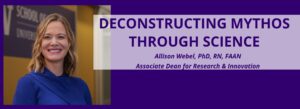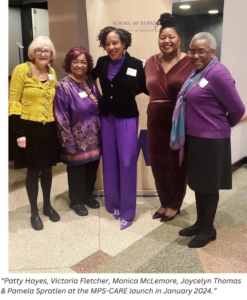
For the past six months, my daughter has been obsessed with the Percy Jackson book series based on Greek mythology. In these stories, an underdog character is chosen to embark on an adventure that requires courage; danger; and a potential loss of livelihood, limb or life for themselves, or those they love. Should the adventurer survive and achieve their conquest, honor and legendary status are conferred – and perhaps even a place among the stars. This is a wholly human narrative, and its motifs appear long throughout the history of storytelling: Greek mythology, Augustan propaganda, religious texts, Arthurian legends, all manner of motion pictures, and even with the story Florence Nightingale.
Nursing has many socially constructed myths. Racial, class, and even gender superiority; more credentials being akin to more expertise; nursing as a calling not a job; and sacrifice and martyrdom by nurses are required to maintain our profession’s nobility (but noticeably no one else). While all interconnected, it is the first myth, the myth of racial superiority that the Manning Price Spratlen Center for Antiracism and Equity in Nursing was created to dismantle. Initially under the direction of Dr. Butch de Castro, and most recently under the leadership of Dr. Monica McLemore, the scholarly work of this center over the past four years has been wide-ranging, provocative, and inspirational.
In a recent conversation with Dr. McLemore, we discussed her proudest moments as the MPS-CARE Director, and her hopes for the future of the center. A common theme emerged – her unfailing belief in science.
“When I was a clinical nurse, I realized that science would be forever.” This realization is what motivated her to pursue a scientific career, to lead the RWJF report, Mapping the Landscape of Anti-Racism in Nursing, characterizing the current efforts and potential scientific pathways for nurses to dismantle racism within our own profession, thereby enabling more equitable healthcare for all. Yet, not unlike mythological heroes, Dr. McLemore knows that while what we as scientists describe and discover will inevitably be eclipsed; the knowledge gained from our scientific journey will outlast us all.
 Last week, the University of Washington said goodbye to Dr. McLemore as she departed to undertake a new leadership role at the NYU Rory Myers College of Nursing. Her leadership will be missed. However, the work of dismantling mythology in nursing extends far beyond the work of one individual or one center. It is the work of all of us, and science offers tools to allow us to accomplish this work. Audre Lorde said, “…and that visibility which makes us most vulnerable is that which also is the source of our greatest strength.”
Last week, the University of Washington said goodbye to Dr. McLemore as she departed to undertake a new leadership role at the NYU Rory Myers College of Nursing. Her leadership will be missed. However, the work of dismantling mythology in nursing extends far beyond the work of one individual or one center. It is the work of all of us, and science offers tools to allow us to accomplish this work. Audre Lorde said, “…and that visibility which makes us most vulnerable is that which also is the source of our greatest strength.”
Science brings about visibility to truths previously unseen. Gravity, entropy, microbial fermentation, and CRISPR, were all invisible until the tools of science transformed them into some of the greatest forces on earth. Nurse scientists have and continue to apply systemic observation, experimentation, and reason to reveal proof and illuminate how we can innovate physical, biological, social, and digital tools to help all people achieve their best possible health. Yet despite their paramount importance, observation, experimentation, and reason are currently being undervalued and undermined to an extent not seen in decades. We, as a community, with our practice firmly rooted in science, must come together to defend these keystones of knowledge. It is imperative that we not only seek scientific data but also increase our ability to articulate the impact of our work broadly across all communities in which we practice, collaborate, and serve. As nurses, we occupy a unique vantage point, often situated at the intersection of science and humanity. Perhaps this unique perspective serves as our greatest strength, enabling us to draw back the curtain on many long-standing myths, and turn toward the source of scientific truth.
~Allison Webel, PhD, RN, FAAN